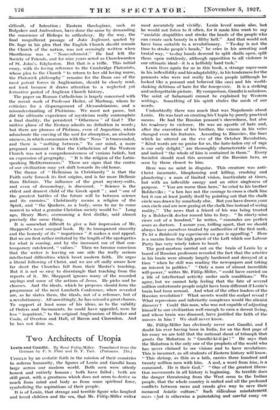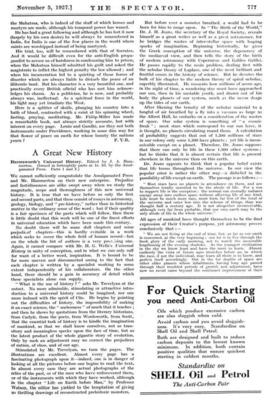Two Architects of Utopia
Lenin and Gandhi. By Rene Fulop-Miller. Translated from the German by F. S. Flint and D. F. Tait. (Putnams. 218.)
UPIIELD by an ecstatic faith in the mission of their countries to redeem humanity, the figures of Lenin and Gandhi loom large across our modern world. Both men were utterly honest and entirely human ; both have failed ; both are still great, with a greatness which does not seem to derive so much from mind and body as from some spiritual force, symbolizing the aspirations of their people.
It is of Lenin, that strange and terrible figure who laughed and loved children and the sea, that Mr. FOlkip-Miller writcs most accurately and vividly. Lenin loved • music also, but he would not listen to it often, for it made him want to say "amiable stupidities and stroke the heads of the people who can create such beauty in a filthy hell." And that would -not have been suitable to a revolutionary. " To-day is not the time to stroke people's heads," he cries in his arresting and brutal way, to-day hands descend to split skulls open, split them open ruthlessly, although opposition to all violence is our ultimate ideal—it is a hellishly hard task."
Lenin lives again for us in this book, a strange super-man in his inflexibility and his adaptability, in his tenderness for the peasants who were not really his own people (although he
looked like a peasant and behaved like one) and his world- shaking delirium of hate for the bourgeoisie. It is a striking
and unforgettable picture. By comparison, Gandhi is nebulous. The saint of Sabarmati cannot be explained by Western writings. Something of his spirit eludes the mesh of our words.
Undoubtedly there was much that was Napoleonic about Lenin. He was bent on creating his Utopia by purely practical means. He had the Russian peasant's shrewdness, but also his tendency to violence. He was an apostle of hate and, after the execution of his brother, the venom in his veins changed even his features. According to Zinoviev, the lines which he uttered on the eve of the October Revolution, " Kind words are no praise for us, the hate-laden cry of rage is our only delight," are thoroughly characteristic of Lenin, and indeed " the whole of him is contained in them." Every Socialist should read this account of the Russian hero, as seen by those closest to him.
Here was no saint in disguise. This creature was anti- Christ incarnate, blaspheming and killing, crushing and plundering ; a man of limited vision, inarticulate at times, but with an inflexible energy and an utter singleness of purpose. " You are worse than hens," he cried to his brother Bolsheviks ; " a hen has not the courage to cross a chalk line but it can at least justify itself by pointing out that the chalk circle was drawn by somebody else. But you have drawn your own circle and are now gazing at the chalk line instead of seeing reality." The news that a friend of his was being treated by a Bolshevik doctor roused him to fury. " In ninety-nine cases out of a hundred," he writes, " comrades are perfect asses as doctors. I assure you, trifling apart, that we should always have ourselves treated by authorities of the first rank.
To let a Bolshevik try experiments on you is appalling.' Here is a maxim from the high priest of the Left which our Labour Party has very wisely taken to heart.
The post-mortem carried out on the brain of Lenin by a board of Russian professors revealed the fact that the arteries in his brain were already largely hardened and decayed at a time " when he still was reading the newspapers and taking an interest in politics." " Only a man of almost incredible will-power," writes Mr. Ffiliip-Miller, " could have carried on a life of intellectual activity under such conditions." We agree, but we cannot help feeling that the fate of several million unfortunate people might have been different if Lenin's brain had been normal. And what of the other leaders of the Russian revolution ? What secrets would the scalpel reveal ?
What repressions and inferiority complexes would the alienist discover ? Could this man, who was not capable of adjusting himself to our civilization well enough to earn a decent living, and whose brain was diseased, have justified the faith of the masses in him ? We shall never know.
Mr. Mop-Miller has obviously never met Gandhi, and I doubt his ever having been in India, for on the first page of his essay we are told that the national shout of triumph that greets the Mahatma is " Gandhi-ki-ii-jai " He says that the Mahatma is the only one of the prophets of the world who has never claimed to see visions and to have revelations.
This is incorrect, as all students of Eastern history will know. " This shrimp, as thin as a lath, carries three hundred- and
twenty million men with him. A nod; a word from him; is a command. He is their God." " One of the greatest libera- tion movements in all history is beginning. So terrible does
the danger threatening from the West seem to the Indian people, that the whole country is united and -all the profound conflicts between races and creeds give way to save their menaced Asiatic culture." Such ridiculous misstatement mars what is otherwise a painstaking and careful essay on
the Mahatma, who is indeed of the stuff of which heroes and martyrs are made, although his temporal power has waned.
He has had a great following and although he has lost it now (largely by his own desire) he will always be remembered in India, for India is one of the few places in the world where saints are worshipped instead of being martyred.
His trial, too, will be remembered with that of Socrates. And it would be difficult even for the anti-English propa- gandist to accuse us of harshness in condemning him to prison, when the Mahatma himself admitted his guilt and asked the magistrate to inflict the highest penalty the law allowed ; and when his incarceration led to a quieting of those forces of disorder which are always liable to disturb the peace of an illiterate land. But his character is a very beautiful one, and practically every British official who has met him acknow- ledges his charm. As a politician, he is now, and probably always was, ineffectual. As a spiritual force in the world, his light may yet irradiate the West.
Here is a splitter of skulls, plunging his country into a bath of blood, contrasted with a saint at his spinning wheel, fasting, praying, meditating. Mr. MET-Miller has made a remarkable book, not always strictly accurate, but with interest on every page. Lenin and Gandhi, are they not both instruments under Providence, working in some dim way for that flower of peace on earth for whose beauty the nations



















































 Previous page
Previous page